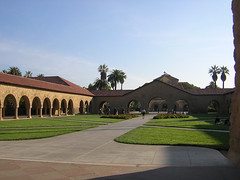In terms of biology, the tendency of a family to care for on another can imply a stronger fitness for their respective genes. Sociologically, family ties (á la Mafia) carry political and economic consequences. My sister visited me this past week and it became obvious to me that some of the Tam family traits (potty humor, cross cultural references, and sarcasm) carry a lot of value for me. As individualistic as our society would have us believe ourselves to be, I am glad for this reminder of my biology and of my upbringing. I love you Tam Family!
Talking to the people of Tijuana, I've come to realize that the notion of family is incredibly strong on this side of the border fence. It's rare for people to move away from their parents. Even leaving one's immediate family for a week is a BIG deal. For better or for worse, I'm not sure that I could be where I am (thousands of miles away from my family) if I had grown up on this side of the border.
PS, Mexico beat the dUS 2 to 1 in a World Cup qualifier this past Sunday. Kasey Keller, a long time dUS keeper from Lacey, Washington (woop! woop!), played really well despite the shitty defense of the red, white, and blue. Where are Alexei Lalas, Marcelo Balboa, and Eddie Pope when you need them! We need to win the upcoming game against Guatamala in order to stay in the runnings.
Currently listening to: Tijuana pop star Julieta Venegas
Currently reading: "How to Change the World: Social Entrepreneurs and the Power of New Ideas" by David Bornstein
Wednesday, March 30, 2005
Sunday, March 20, 2005
Hecho en Mexico
Insight often comes out of context. For me, it came when talking to a recovering drug addict. “Where are you from?” I asked. “Hecho en Mexico,” he replied. His situation and mine are largely a part of where we were born. His drug-riddled city, Tijuana, is full of rehabilitation centers. My yuppy-riddled city, Seattle, is full of psychologists, lawyers and coffee houses. Yet, despite these differences, we were working side-by-side, mixing concrete for an elementary school playground. Yes, it inspires a beautiful image of community, however, distinct differences in our respective opportunities to share remain. A citizen of the dUS, I can legally cross back and forth between the dUS-Mexico border without much paperwork. As a Mexican citizen, he most likely requires an endless amount of documents to cross an imaginary international line. Do I feel guilty when I’m able to drive from my home in Tijuana to the San Diego Airport to pickup my sister and I know that some of my co-workers are unable to access the same opportunity? Of course.
An interesting study of Latin American language (i.e. Spanish) reveals another insight. Use of the word “Americano” refers to those who live in the Americas (both North and South). Only dUS citizens refer to themselves as “Americans.” Citizens of the dUS (and Canada) are referred to as “Norte Americanos.” What do you think that implies about the “North American Free Trade Agreement” (NAFTA)? Is that really a pact that benefits all the “Americanos” or just the “Norte Americanos?”
Every day I spend in Tijuana challenges me to re-learn about this culture in which I am participating. What words are used when addressing different individuals? How can a personal conflict turn into one between me and the entire Mexican population? How do communal notions of respect co-exist with systematic disrespect? There’s so much to learn still and each bit opens my window to a fundamentally different way of living.
An interesting study of Latin American language (i.e. Spanish) reveals another insight. Use of the word “Americano” refers to those who live in the Americas (both North and South). Only dUS citizens refer to themselves as “Americans.” Citizens of the dUS (and Canada) are referred to as “Norte Americanos.” What do you think that implies about the “North American Free Trade Agreement” (NAFTA)? Is that really a pact that benefits all the “Americanos” or just the “Norte Americanos?”
Every day I spend in Tijuana challenges me to re-learn about this culture in which I am participating. What words are used when addressing different individuals? How can a personal conflict turn into one between me and the entire Mexican population? How do communal notions of respect co-exist with systematic disrespect? There’s so much to learn still and each bit opens my window to a fundamentally different way of living.
Friday, March 11, 2005
Institutions of Power
Walking around the Stanford campus on a sunny day in Palo Alto, I see a future battlefield. Why isn't there graffiti on the fences? Why are the parking lots filled with BMW's? Why are the majority of service-people latinos? The halls of education are sheltered by walls of money. We can talk about diversity, but until I see real multicultural dialogue (oral and visual) I won't believe it. We can talk about a level playing field, but until the pre-season training is open to everybody I won't trust it. We can talk about "fostering skills and passion to improve the health of the world's people through research, innovation, and leadership," but if only 10% of research money is going towards improving the health of a vast majory of the world's population, I can't agree.
In other news, the amount of money sent by Mexican nationals into their home country (mostly from the dUS) reached $6.6 billion last year and is expected to become responsible for the largest cash import this year, surpassing the foreign sale of Mexican oil. Meanwhile, the dUS Congress is debating whether or not to make it (1) harder for Mexicans to enter the dUS illegally and (2) more difficult to obtain any legal documentation (i.e. driver's licenses) after reaching the dUS.
In other news, the amount of money sent by Mexican nationals into their home country (mostly from the dUS) reached $6.6 billion last year and is expected to become responsible for the largest cash import this year, surpassing the foreign sale of Mexican oil. Meanwhile, the dUS Congress is debating whether or not to make it (1) harder for Mexicans to enter the dUS illegally and (2) more difficult to obtain any legal documentation (i.e. driver's licenses) after reaching the dUS.
Subscribe to:
Posts (Atom)


